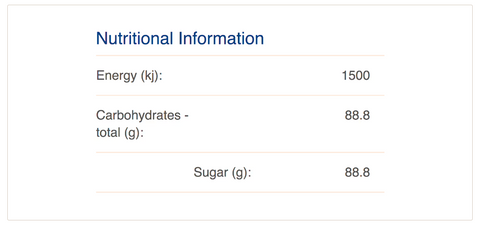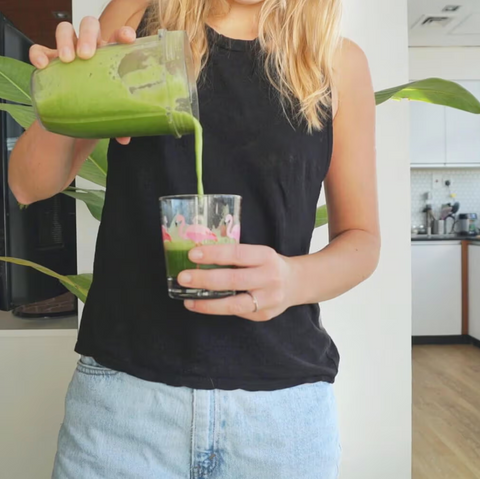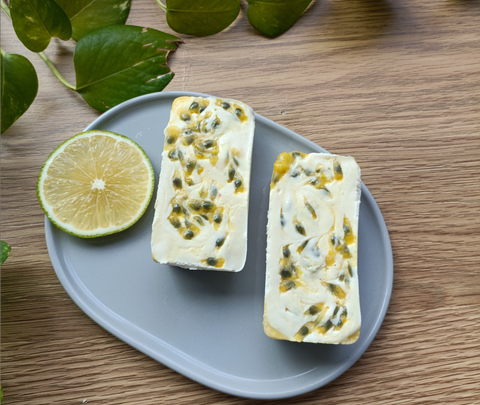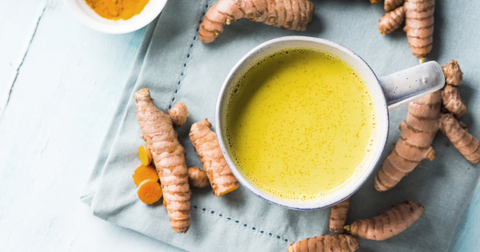Not all wholefood supplements are created equal. Here are the most important things to consider when choosing a greens powder...
The Role Of Supplements In A Balanced Diet
We believe that there’s no way to ‘out-supplement’ a poor diet.
Adopting a food-first approach to health is crucial for overall wellbeing and longevity.
However with our busy lives and modern industrialised food supply, sometimes a great diet just isn’t enough.
Most of the food we eat today is grown in nutrient-depleted soils and lacks genetic diversity, so adding a wholefood greens powder to your wellness routine is a great way to ensure that you’re getting the variety of nutrients that your body needs to function optimally.
Think of it as a nutritional insurance policy!
Why You Should Probably Be Taking A Greens Powder
Greens powders are a super easy way to increase and diversify your intake of vegetables, herbs, algae and other superfoods.
There are 3 main reasons why you should consider adding a greens powder to your daily wellness routine...
1. Our Soils Are Nutrient-Deficient
The food we eat today is very different from the food our grandparents ate.
Industrial mono-crop farming techniques have depleted our soils of crucial nutrients, and as a result, many of the fruits and vegetables that we consume contain significantly lower levels of nutrition than they used to.
Taking a quality greens powder supplement each day is a great way to optimise your nutritional inputs.
2. Our Produce Lacks Genetic Diversity
Did you know there are roughly 300,000 edible plant species in the world?
Yet after 10,000 years of agricultural civilisation, less than 300 species have been cultivated as significant food sources and only about 30 species represent the staple plant foods consumed in a western diet.
Due to consumer demand, many of our fruits & vegetables have been selectively bred to yield larger, sweeter, less bitter, and more uniform produce.
This process reduces the concentration and diversity of micronutrients in our crops, and therefore in our diets.
Every plant species contains different nutrients, so the more diversity we have in our diet, the wider the range of nutrients that our body receives.
Think about it… when was the last time you had a dandelion leaf? Or a globe artichoke? Or some broccoli sprouts?
Taking a greens powder each day will expose you to a broader range of nutrients that you’re unlikely to be consuming in your regular diet - and it’s a great way to consume nutrients from plants that don’t taste too good on their own!
3. Our Modern Lifestyle Depletes Vitamins & Minerals
Not only are we absorbing fewer nutrients from our diets, but our bodies actually require more nutrients to function optimally in the modern world due to increased risk factors such as environmental toxicity, inflammation & chronic stress.
One great example of this is our body's inbuilt detoxification system.
Since the industrial revolution, the amount of environmental toxicity that humans are exposed to on a daily basis has skyrocketed.
Our liver has the complex responsibility of processing all of these compounds into forms that can be excreted from our body.
This is a nutrient-intensive process, which requires a range of specific micronutrients that are abundant in cruciferous vegetables (broccoli, cabbage, cauliflower etc.), allium vegetables and bitter greens/herbs like dandelion, globe artichoke leaf, turmeric and St. Mary’s thistle.
Supplementing with a high-quality greens powder is a great way to prevent deficiencies, and ensure that your body has the nutritional fuel it needs to function optimally every day.
Ingredients To Look For In A Greens Powder
The best greens powder for you will depend on whether you have any specific health concerns, but as a general rule, here are a few ingredients that you should look for...
Super Algae
Algae like spirulina and chlorella are some of the most nutrient-dense plants on earth, and yet they’re not a regular part of our diet (for obvious reasons.)
These super algae are rich in a number of micronutrients including magnesium, zinc, copper, potassium, calcium, folic acid and other B vitamins.
Spirulina and chlorella are also some of the only known plant sources of omega 3’s & all 9 essential amino acids - which makes them a critical nutritional resource for anyone living a plant-based lifestyle.
Grasses (Wheat, Barley, Alfalfa)
Wheatgrass, barley grass and alfalfa all contain high amounts of vitamin A, vitamin C, vitamin K, thiamin, riboflavin, niacin, vitamin B6, pantothenic acid, iron, zinc, copper, manganese and selenium.
These cleansing greens are a diverse source of nutrients, and like algae, they don’t usually feature heavily in most people’s diets.
Bitter Greens
Bitter greens like dandelion leaf and globe artichoke are also very nutrient-dense.
The bitter compounds in these plants support bile function, which increases the body’s ability to eliminate toxic substances once they are processed by the liver.
Liver Loving Herbs
Herbs like St. Mary’s thistle, globe artichoke, dandelion leaf & turmeric are considered “hepatoprotective”, which means that they protect the liver from damage and help it to function optimally.
St Mary’s thistle is one the most popular herbs for liver health thanks to a flavonoid it contains called Silymarin.
Silymarin is an important antioxidant which protects the body by optimizing liver function and detoxification. It also helps repair damage to the liver's cells.
Cruciferous Vegetables
Cruciferous vegetables like broccoli are jam-packed with vitamins, minerals and other active compounds that are responsible for a number of incredible health benefits.
These powerful veggies have been shown to help reduce inflammation, aid blood sugar control, support healthy heart function, improve digestion, help slow the aging process, prevent DNA damage and help to prevent certain types of cancer.
Ingredients To Avoid In A Greens Powder
There are a lot of greens powders out there, but not all are created equal.
Some important things to avoid when choosing your greens powder are - artificial sweeteners, artificial colours, artificial flavours, sugars, emulsifiers, and basically any ingredient that has a number in brackets after it.
However, there’s one more sneaky ingredient that most people don't notice, and it’s actually in most greens powders!
Why You Need To Beware Of "Natural Flavours"
The term “natural flavouring” has no formal legal definition in the context of food production.
Australia's Food Safety Authority (FSANZ) defines Natural Flavouring substances (CAC/FL 66-2008 item 2.2.1.1) as:
“flavouring substances obtained by physical processes that may result in unavoidable but unintentional changes in the chemical structure of the components of the flavouring (eg distillation and solvent extraction), or by enzymatic or microbiological processes, from material of plant or animal origin. Such material may be unprocessed, or processed for human consumption by traditional food preparation processes (eg drying, torrefaction (roasting) and fermentation). This means substances that have been identified / detected in a natural material of animal or vegetable origin"
In simple terms, natural flavours are often heavily processed and can contain chemical additives
Our Experience Trying To Formulate A Greens Powder
At first we thought using “natural flavours” would be a great way to make our greens powder, WonderWild™, taste delicious without compromising on quality.
After researching all the suppliers of natural flavours in Australia, we were shocked to learn that "natural" didn't really mean what we thought it did.
Here's an excerpt from one of Australia's biggest flavour suppliers.
Product: Natural Lemon Flavour (Powder)
Description: A fine white crystalline powder with a distinct lemon flavour and aroma when diluted as recommended.
Ingredients: Dextrose monohydrate (corn derived), and natural flavouring substances, rosemary extract (392)
Let's break those ingredients down.
Dextrose Monohydrate: Dextrose is the name of a simple sugar that is made from refined corn and is chemically identical to glucose (or blood sugar).
Natural Flavouring Substances: Undefined inputs.
Rosemary Extract (392): Rosemary extract may sound like a natural ingredient, but the extraction process usually involves the use of chemical solvents like hexane (derived from the fractional distillation of petroleum), ethanol and acetone. The end result is a highly processed compound that has very little in common with Rosemary.
Below is an excerpt from the nutritional information panel for this “Natural Lemon Flavour” (per 100g.)

That's 88.8% sugar.
It's a similar story for all of the natural flavours that are commonly found in most superfood powders.
Basically, if your greens powder tastes good, it probably has these compounds in it.
What's worse though, is that because these are "ingredients within an ingredient", the brands that use them aren't required to list the individual compounds as ingredients on their labels.
How We Made Our Greens Powder Taste Amazing Without Using Added Flavours
After a whole year of research, and hundreds of different formulations, we finally found the perfect combination of wholefood ingredients that now gives our greens powder, WonderWild™, its incredible flavour.
Instead of using sugar-based “natural flavouring”, we combined whole lemon juice powder with pure monk fruit extract.
After tweaking the formulation a few more times, the result was one of the most delicious greens powders we’ve ever tasted (and we’ve tasted pretty much all of them!)



